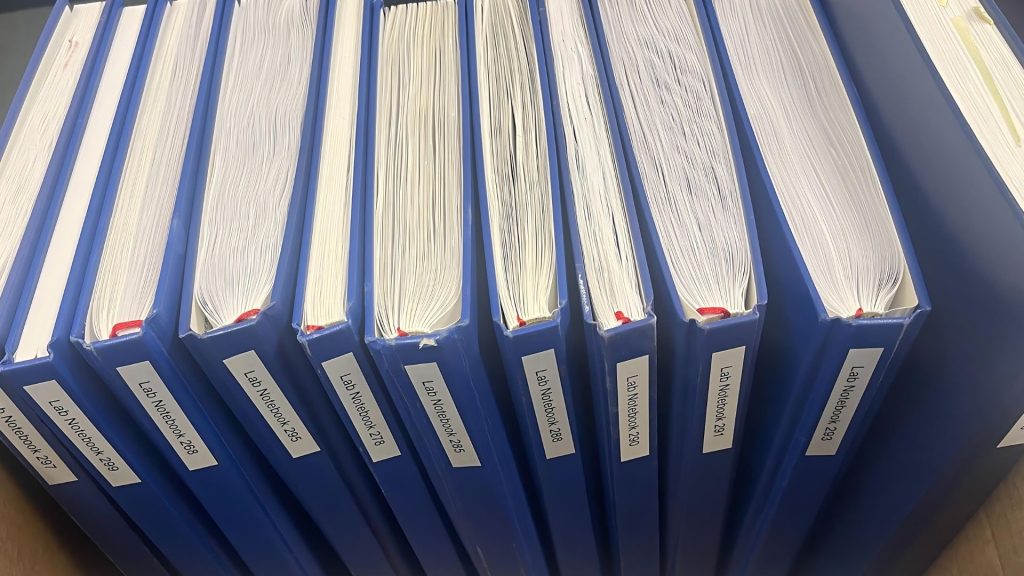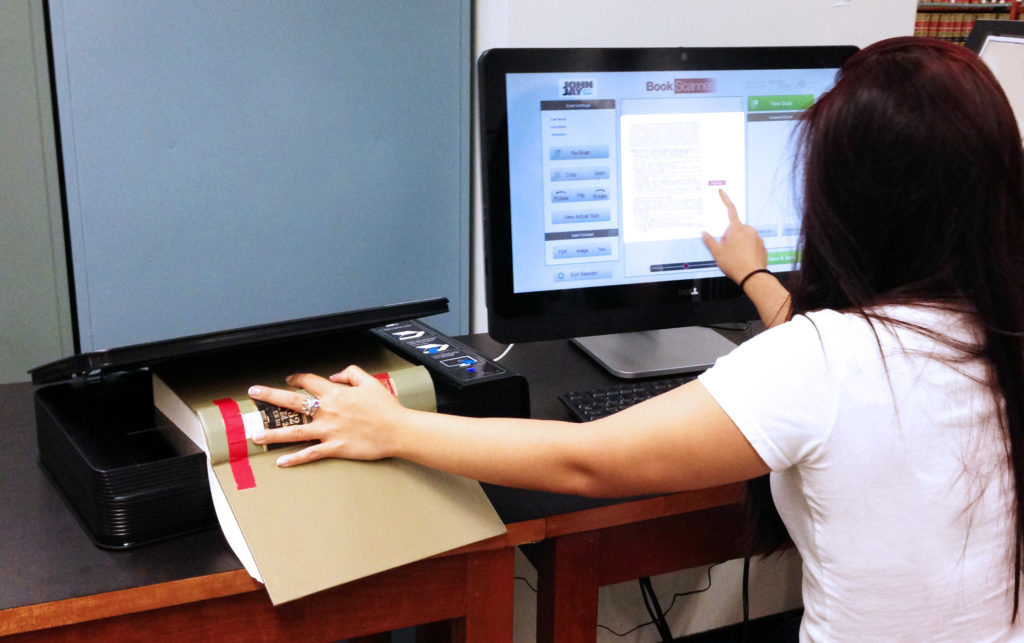Did you know 94% of companies that suffer catastrophic data loss never recover, 43% never reopen, and 51% fail within two years? (Source)
Even small-scale data loss from fires or misplaced backups can kill a lab project. Meanwhile, the document scanning services market is growing fast, from $4.67 billion in 2024 to $5.23 billion in 2025, a 12% annual growth rate, with a projected reach of $8.12 billion by 2029
It shows that labs recognize the importance of digitizing and safeguarding lab notes as vital for survival.
Given these alarming statistics and the rising shift toward digital documentation, the question isn’t: if labs should digitize their records – it’s why they haven’t already.
Beyond just avoiding disaster, there are several clear reasons why secure lab notebook digitization and backup should be a priority for every research-driven organization:
Why Do Labs Need to Digitize Their Notebooks?
Here’s why more labs are turning to digital archiving and secure backup:
- Protect research from fire, flood, loss, or theft
- Enable fast access through searchable, organized digital files
- Meet compliance standards like HIPAA, FADGI, and FERPA.
- Save time by avoiding repeated experiments or manual data entry
- Ensure continuity during audits, staff turnover, or lab transitions
At eRecordsUSA, we provide specialized lab notebook digitization services tailored to the needs of scientific and research teams. Our high-resolution, non-destructive scanning ensures every page is captured clearly without harming the original notebook.
We add complete metadata tagging- such as dates, researcher names, and project titles to support traceability and compliance.
What sets us apart? We don’t just scan – we secure. Our 20+ years of experience with regulated industries make us a trusted partner for labs that can’t afford to compromise on data integrity or compliance.
With a reliable digitization and backup strategy in place, labs take a significant step toward long-term data security and compliance. But when it comes to managing lab records digitally, another important question arises: should you scan existing notebooks, switch to an Electronic Lab Notebook (ELN), or use both?
What Is the Difference Between Non-Destructive Scanning and an ELN?
Non-destructive scanning and Electronic Lab Notebooks (ELNs) serve different needs in a lab’s digital workflow. Scanning is ideal for preserving existing handwritten or printed notebooks without altering them. It creates high-quality digital replicas of historical data, useful for archiving, audit readiness, and legal protection.
ELNs, on the other hand, are software platforms where researchers enter data directly during experiments. They offer real-time editing, timestamps, version control, and integrations with instruments or databases.
ELNs are great for live data capture and collaboration, but they don’t replace the need to preserve legacy records or comply with retention policies for physical notebooks.
Here’s the key difference:
- Scanning captures what already exists;
- ELNs manage what’s created moving forward.
For many labs, the best solution is a hybrid: scan old notebooks for compliance and traceability, and use an ELN for new experiments moving forward.
Whether you’re scanning old notebooks or using digital tools like ELNs, what truly brings order and compliance to lab records is how well the data is organized. That’s where metadata tagging plays a critical role – it turns scanned pages into searchable, traceable, and regulation-ready records.
How Does Metadata Tagging Improve Traceability and Compliance?
Metadata is the behind-the-scenes information that gives your scanned lab records meaning.
It answers key questions:
- Who wrote this?
- When was it recorded?
- What experiment does it belong to?
With proper metadata tagging, every scanned page becomes part of a structured, searchable system.
For traceability, metadata links each record to the researcher, project, and timeline. This helps labs recreate experimental sequences, verify results, and respond to audits with confidence. It also supports reproducibility – an essential part of modern scientific standards.
From a compliance perspective, metadata ensures that digital records meet documentation laws like HIPAA, FERPA, ISO 27001, and GDPR security standards. Regulators expect labs to show when and how records were created, modified, and reviewed. Metadata provides that evidence.
At eRecordsUSA, we apply detailed metadata tags during the scanning process. Tags can include author name, date, lab section, department, and experiment title, etc based on the client’s specific requirements. This creates a digital trail that holds up under inspection and improves internal data organization at the same time.
With metadata in place to organize your lab records, the final piece of the puzzle is ensuring those records are always safe, no matter what. That’s where a rock-solid backup strategy of a lab notebook becomes essential.
How Do Backup Strategies Help Labs Protect Their Research Data?
Backing up your lab data isn’t just about storage; it’s about safety. When records are lost, damaged, or tampered with, labs can face serious consequences: delayed experiments, failed audits, or lost funding.
That’s why having a reliable backup strategy is a key part of protecting research data.
At eRecordsUSA, once your lab notebooks are scanned and tagged, we make sure your digital files are stored safely. Every file is backed up in secure systems, giving your lab peace of mind, even during unexpected events.
Here’s how backup helps safeguard your research:
- Keeps data safe from accidents like fire, flood, or hardware failure
- Meets legal and grant requirements by maintaining audit-ready records
- Prevents workflow disruption during staff turnover or lab transitions
- Provides quick recovery if the original files are lost or corrupted
Whether it’s a small academic lab or a large research facility, having secure backups ensures your work isn’t lost, and your credibility stays intact. However, protecting research data doesn’t end once it’s backed up. Labs must also manage how long records are kept, and how changes to those records are tracked.
Without clear version control and retention rules, even well-protected data can become a liability.
How Do Version Control and Retention Policies Help Safeguard Research Data?
Research data often evolves – experiments get revised, reports are updated, and annotations are added.
Without version control, it’s hard to tell which copy is the most accurate or final. That can lead to confusion, errors, or worse, compromised research integrity.
Version control helps track every update made to a file. It shows who made changes, when, and what changed. This creates a clear record of the data’s evolution, which is essential for both scientific reproducibility and legal accountability.
Retention policies, on the other hand, define how long records should be kept before they’re archived or deleted. These policies are often dictated by grant agencies, institutional policies, or regulatory frameworks. Keeping data too short may break compliance. Keeping it too long can create unnecessary risk.
Also read – How Lab Notebook Scanning Preserves Annotations & Markings?
What’s the Real Value of Protecting Your Research Data?
Protecting your research data isn’t just about avoiding loss—it’s about securing the future of your work, your team, and your credibility. When data is digitized, encrypted, and backed up properly, labs gain more than just compliance; they gain control.
Here’s what strong data protection delivers:
- Time savings: No more searching for old notebooks or redoing lost experiments
- Improved credibility: Clear, versioned records improve reproducibility and trust
- Regulatory confidence: Easily meet HIPAA, FERPA, FADGI and audit requirements
- Funding readiness: Well-managed data shows grant committees and partners you’re organized and secure
- Operational continuity: Transitions and staff changes don’t put research at risk
Quick Data Protection Checklist
Before you wrap up your digitization plan, make sure you’re covered:
- Are all lab notebooks digitized?
- Is your data encrypted during storage and transfer?
- Do your files include metadata for traceability?
- Are versions tracked and archived properly?
- Do you have backups—on-site, off-site, or hybrid?
- Are you aligned with relevant compliance standards?
📞 Ready to Safeguard Your Lab’s Research?
At eRecordsUSA, we specialize in helping labs like yours digitize and secure critical data. From high-resolution scanning and metadata tagging to backup and retention planning, we provide an end-to-end solution tailored for scientific, academic, and regulated environments.
Call us at 1.510.900.8800 or write us at [email protected] to schedule a consultation or request a free quote.
Let’s make sure your lab’s hard work never gets lost.



